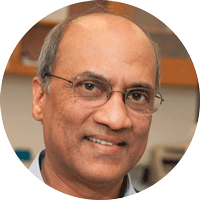

| Catholic University faculty and students are immersed in a culture of research. In this series we offer a sampling of the many big questions they are working on. |

For more than 30 years, Venigalla Rao and his team in the Department of Biology have been studying a benign virus, known as bacteriophage T4, that infects Escherichia coli bacteria. Their research has garnered hundreds of findings related to the basic mechanisms of viral DNA packaging, the atomic structures of molecular machines, viral engineering by CRISPR genome editing, and vaccines for anthrax, plague, and even HIV.
What links these projects, Rao says, is one underlying goal: “to learn about the basic mechanisms of a virus at the deepest level possible and apply this knowledge to redesign the virus for beneficial purposes.”“Viruses have probably evolved over millions of years, so that they can efficiently enter our cells and use them as factories to produce new viruses. This makes us sick and is sometimes deadly. We are trying to program the viruses in a test tube such that they can enter our cells but perform specific tasks or repairs that benefit us rather than infect us. These specific tasks include gene therapy, stem cell therapy, immunotherapy, and others.”
“We are closer than ever to accomplishing the ultimate goal: creating a unique bacteriophage T4 virus platform to cure diseases, including HIV or even cancer. We could potentially be moving towards human trials in about five years to cure a disease, using our technology. Now we should be leaping forward, not just walking forward.”
Venigalla Rao, professor of biology, is a leading expert on viruses and associated applications such as gene therapy and vaccine development. He has received an extensive number of grants and publications within the past several years, including a prestigious Bench to Bedside grant from the NIH. Since founding his lab in 1989, he has filed numerous patents and written for prestigious publications including Cell, Nature Communications, Science Advances, Proceedings of National Academy of Sciences USA, Virology, and more.